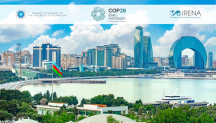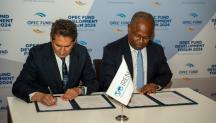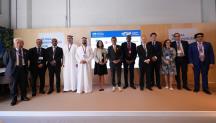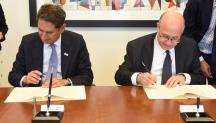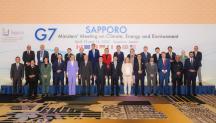

IRENA’s ETAF Recognised as Key Accelerator for Just Transition
Newsletter
As governments and energy corporations throughout the world make bold commitments to cut carbon emissions to net-zero by 2050, the impetus for the battle against climate change is now stronger than ever. However, fulfilling these commitments requires substantial financial reallocation toward low-carbon technologies, including renewables, and mobilising all available funding sources. For the energy system to be compatible with the 1.5°C pathway, IRENA estimates that USD 131 trillion needs to be invested by 2050; 80 per cent of this figure must go into energy transition technologies.
To fill the funding gap for scaling up renewable energy projects in developing countries, IRENA launched the Energy Transition Accelerator Financing Platform (ETAF) in 2021 at COP26. The platform is a multistakeholder climate finance solution dedicated to advancing the global energy transition by mobilising and directing close to USD 1 billion into renewable energy projects in developing markets.
With ETAF now operational and open for project submission under IRENA’s management, the Agency held a high-level ministerial dialogue between ETAF partners and stakeholders on 15 January, at the 13th IRENA Assembly in Abu Dhabi. The goal of the event was to discuss the platform's role in accelerating the energy transition in developing economies.
“The support of our partners has enabled us to mobilise close to our initial target of USD 1 billion at the end of 2022. We have capitalised on this momentum to continue discussions with additional partners,” said Francesco La Camera, Director-General, IRENA. The Director-General emphasised that, in addition to raising funds, ETAF's responsibility is to offer a strong project pipeline to meet the requirements set out by financial partners.
ETAF capitalises on the UAE’s climate finance market as the country committed an anchor investment of USD 400 million through the Abu Dhabi Fund for Development during the platform’s launch. Dr. Nawal Al-Hosany, the UAE's Permanent Representative to IRENA, reaffirmed the country's commitment to the cause by noting that, by 2050, investments in green energy technology are expected to total at least USD 100 trillion. "No nation or business can manage this investment alone. To achieve this goal, we require the cooperation of governments, international organisations, development banks, and the private sector,” she added.
Speaking about how the accelerator platform can help mitigate investment risks in developing countries struggling to secure sufficient capital, Mahmoud Mohieldin, the United Nations Secretary General’s special envoy on financing the 2030 Sustainable Development Agenda noted there are many solutions, but the first task is to diversify investment sources. “In a world that is suffering from a variety of crises including the war in Ukraine, for our transition to be just, it must be rapidly accelerated through different sources of finances. ETAF acts as a key accelerator in doing this,” he added.
Rodrigo Salvado, Director General, Operational Partnership Department, Asian Infrastructure Investment Bank, discussed the need for encouraging accountability, transparency, and more efficient spending. He noted that while raising money is crucial, "His organisation, being a project-focused bank, puts more emphasis on the spending side, that is, it moves the money which is already there."
